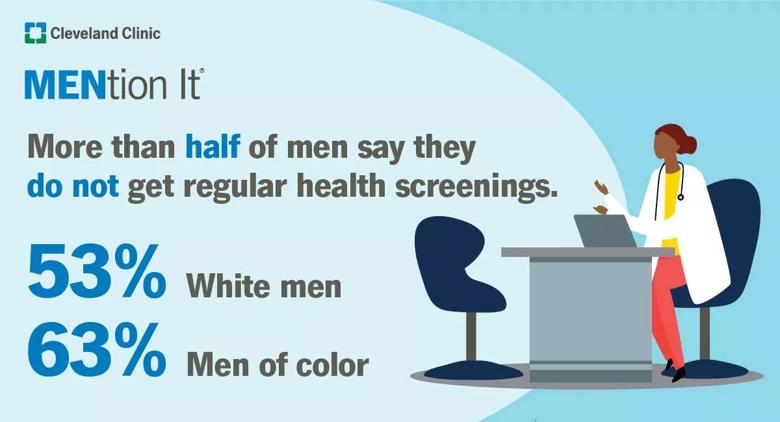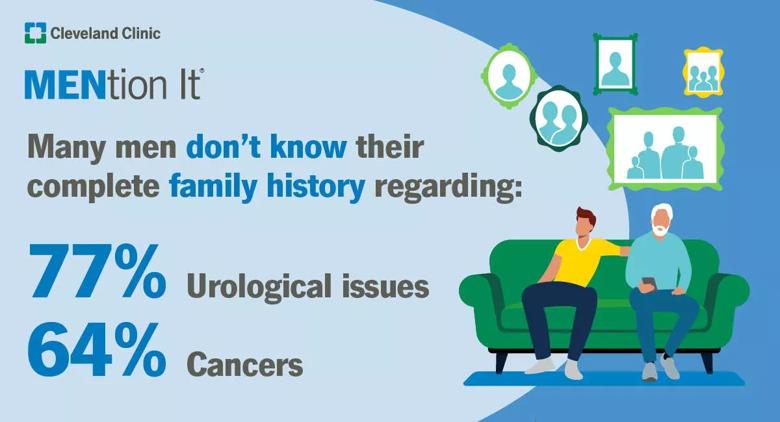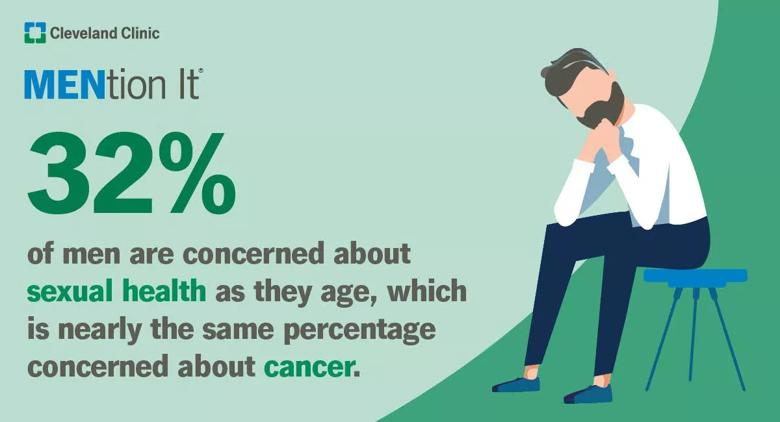National MENtion It campaign examines men’s misconceptions when it comes to health
images: 5
video: 1
audio: 0
text: 0
Content is property of Cleveland Clinic and for news media use only.

A new national survey by Cleveland Clinic reveals which health issues men are most concerned about as they age, and explores many of the common misconceptions that impact men’s health across all generations.
The survey, which was taken earlier this year by a national sample consisting of 1,000 U.S. males, 18 years of age and older, was issued as part of Cleveland Clinic’s seventh annual educational campaign, MENtion It®. The campaign aims to address the fact that men often do not mention health issues or take steps to prevent them.



Among the top four health issues concerning men as they age, the survey finds 38% of men are concerned about cancer* and 32% are concerned about their sexual health**. When it comes to sexual health concerns, 44% of men named erectile dysfunction as their top concern.
However, more than half of men incorrectly think that low testosterone is the most common cause of erectile dysfunction. Findings from the survey show 71% of men who have experienced issues related to sexual health also have been diagnosed with cardiovascular disease or diabetes.
Despite having these concerns, the survey reveals many men are not proactive when it comes to their health and knowing their family health history. Fifty-five percent of men say they do not get regular health screenings, and the majority of men do not know their complete family history when it comes to cancers (64%) and urological issues (77%).
Early detection through preventive health screenings and checkups are essential to diagnosing many of these conditions while they are still in early treatable and curable stages.
“We know men tend to avoid seeking routine medical care and are often unaware of many symptoms that can lead to serious health issues if not identified and treated early,” said Georges Pascal-Haber, M.D., Ph.D., interim chairman of Cleveland Clinic’s Glickman Urological & Kidney Institute.
“In this year’s survey, we wanted to gain a better understanding of the main health concerns of men and educate them on the importance of prioritizing their health.”
Key survey findings:
* Includes prostate cancer, testicular cancer, and/or bladder cancer
** Includes sexual dysfunction (includes erectile dysfunction, delayed or premature ejaculation, lack of interest in sex, inability to become aroused, painful intercourse) and infertility
These pitch points present the key findings of an online survey conducted among a national sample consisting of 1,000 American males, 18 years of age and older, living in the continental United States.
The total male population sample data was weighted to be nationally representative based on age, gender, ethnicity, region, urban vs. rural, household income, and educational attainment census data. The online survey was conducted by Savanta and completed between May 6th and May 17th. The margin of error for the total sample at the 95% confidence level is +/- 3.1 percentage points.
About Cleveland Clinic
Cleveland Clinic is a nonprofit multispecialty academic medical center that integrates clinical and hospital care with research and education. Located in Cleveland, Ohio, it was founded in 1921 by four renowned physicians with a vision of providing outstanding patient care based upon the principles of cooperation, compassion and innovation. Cleveland Clinic has pioneered many medical breakthroughs, including coronary artery bypass surgery and the first face transplant in the United States. U.S. News & World Report consistently names Cleveland Clinic as one of the nation’s best hospitals in its annual “America’s Best Hospitals” survey. Among Cleveland Clinic’s 72,500 employees worldwide are more than 5,050 salaried physicians and researchers, and 17,800 registered nurses and advanced practice providers, representing 140 medical specialties and subspecialties. Cleveland Clinic is a 6,500-bed health system that includes a 173-acre main campus near downtown Cleveland, 22 hospitals, more than 220 outpatient facilities, including locations in northeast Ohio; southeast Florida; Las Vegas, Nevada; Toronto, Canada; Abu Dhabi, UAE; and London, England. In 2021, there were 10.2 million total outpatient visits, 304,000 hospital admissions and observations, and 259,000 surgical cases throughout Cleveland Clinic’s health system. Patients came for treatment from every state and 185 countries. Visit us at clevelandclinic.org. Follow us at twitter.com/ClevelandClinic. News and resources available at newsroom.clevelandclinic.org.
Editor’s Note: Cleveland Clinic News Service is available to provide broadcast-quality interviews and B-roll upon request.